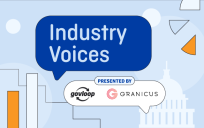 There is only one type of food that I’m willing to work for, and that’s crabs. It could be because I’ve been living in Maryland for the past seven years of life. On the other hand, I dislike needing to peel my shrimp when it’s already in my pasta. It might seem silly, but it’s the same thing with content; people do not want to work to consume what we have to say.
There is only one type of food that I’m willing to work for, and that’s crabs. It could be because I’ve been living in Maryland for the past seven years of life. On the other hand, I dislike needing to peel my shrimp when it’s already in my pasta. It might seem silly, but it’s the same thing with content; people do not want to work to consume what we have to say.
While we have somewhat of a captive audience, they are the reason we do what we do. For most programs, we don’t measure our return on investment in all the same ways a restaurant would. Instead, we often measure success on how many people we’ve educated, cases we’ve prevented, and feedback from the community.
As stewards of taxpayer monies, these measurements of success are critical. Let’s look at four things we can keep in mind when getting our content ready for the web, print or social media.
Consider the Audience
The first step is to consider the people we want to engage with. While we write many things for everyone, some content is for a smaller group of our community. The best ways to communicate with one group may not fit the other. For example, advertising our upcoming summer program on Facebook wouldn’t reach the Youth but their parents or grandparents. That completely changes the way we say things and the images that we use. Observing the way the private sector markets its products can help us to better market our services.
Avoid Governmentese
Choosing our language goes hand-and-hand with considering our audience. The public is not interested in the organization chart or the special language that only we understand. One of my favorite examples of this is the gubernatorial election. That’s the technical term for the midterm election, but is it really what people expect?
We work hard to post timely content, this helps to make sure they can find it. That includes searching on Google, Yahoo, Bing or skimming the navigation on our sites. We are helping ourselves by using the words that people expect.
Write at an 8th-Grade Reading Level
There is a large group of constituents with reading comprehension or other cognitive disabilities. In addition to this, most people visit our sites on their cell phones while doing a million other things. Therefore, our goal should be to write most content at an 8th-grade reading level.
At first, that can sound like a daunting task. I know it did for us when we scanned pages to find them at a 15th-grade level (a junior in college). It’s not as difficult as it may seem and it doesn’t mean we have to “dumb down” our content. What it does mean is that we use shorter sentences and words. Can you believe this article (and all the articles I’ve written so far) is at an 8th-grade level? It’s possible!
While this is a general guideline for WCAG 2.0, there are times when we cannot apply it universally. In those cases, the guideline is to include supplemental information for the public. Don’t worry, I have your back.
We are Never Done on Our Website
One common misunderstanding is that when a website or some sort of online presence is launched, the hard work is over. The truth is that it is just the beginning. I’m sure we both get that. These aren’t projects but continuous works of art.
We can launch a beautiful, accessible and well-written website tomorrow. The question is what happens the day after when content begins to be updated? Look for ways to keep the audience at the foresight at all times. Maybe there are creative ways for us to communicate this with the different editors and divisions.
The public is our customer and great content is a service to us all. Keep up the great work!
Jamie Veals is a GovLoop Featured Contributor. She is an Ohio native living in Maryland, stumbled into local government. With degrees in Computer Science and Networking serving as the entry point, her work bridges the gap between people and tech. With an obsession for planning, she focuses on removing the barriers of government from citizen interactions and making it easy to maintain. With whatever time is left she’s serving in her local church and hosting game nights. You’ll find Jamie writing about doing work tasks more efficiently – whether it’s web accessibility or hosting meetings; anything that could make your transition into government or the digital space easier.





Love the advice, Jamie! This was a good reminder for me!
Excellent advice, particularly “know your audience.” Who are they? What do they want? How do they want it? We aren’t just stewards of taxpayer dollars; we’re stewards of potentially valuable information, and that information can only realize its value when it is effectively shared. Good ideas don’t speak for themselves.